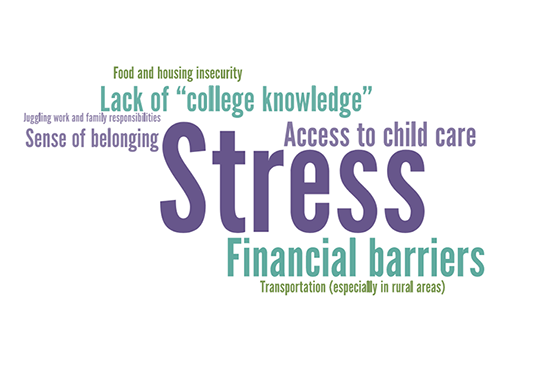Knocking down barriers for our students
A recent article in Community College Daily looked at how life trauma affects community college students. According to the CDC, 61% of Americans experience a traumatic childhood event and that living in poverty increases the likelihood of this.
The author of the article, who is chair of the psychology department at Sacramento City College, said community college students are more likely than those at a university to qualify as low-income.
At the Kentucky Community and Technical College System (KCTCS), we are well aware of the barriers our students face. Many of the most challenging barriers are nonacademic. A 2019 study by the Kentucky Legislative Research Committee (LRC) found five prominent nonacademic barriers that KCTCS students face:
- Inability to navigate college
- Financial instability
- Competing time constraints
- Personal health issues
- Disengagement
The study also found that “compared to university students, KCTCS students are more likely to be first-generation students, be academically unprepared for college, have dependents, have a household income less than $20,000, and be older than 25.”
For first generation students, navigating college is a challenge. They have no one in their family to guide them. That’s where our staff and faculty come in. They are navigators, mentors, cheerleaders and friends to our students.
Because students have time constraints, the 16 colleges are making classes available at times that better fit students’ schedules. This is extremely important for our students who work, which is a good number of them. It’s also important for those caring for children or other family members.
Some of our students lack access to broadband, which is a necessity for remote learning. That’s why we set up hotspots in our college parking lots. It’s not ideal, but it’s helped our students and many who aren’t our students.
Another issue we’ve tried to help bridge is food insecurity because a hungry adult is just as distracted in class as a hungry child. All of our colleges have food pantries to assist students who need a helping hand.
Perhaps the biggest challenge in the minds of some is how to pay for college. In reality, there are many ways to do it, and it all begins with the Free Federal Application for Financial Aid (FAFSA). We offer numerous scholarships and grants, including the Work Ready Kentucky Scholarship that pays for tuition for hundreds of courses.
We will continue to work with our students to help them overcome as many barriers as we can. Our mission is to help improve the lives and employability of Kentuckians. Our faculty and staff live this mission every day.

